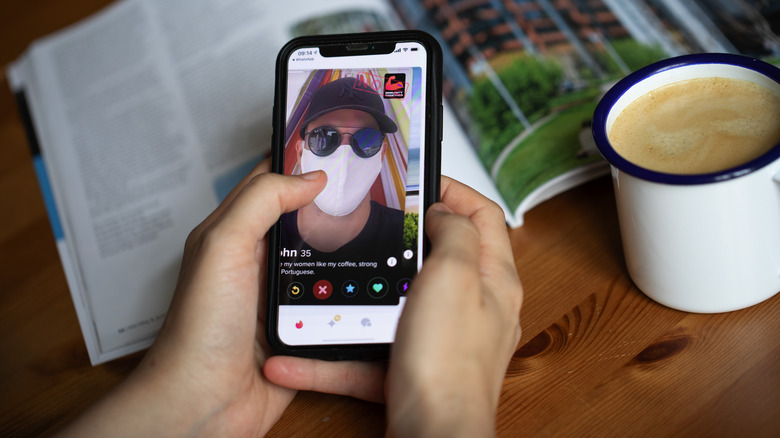5 Signs You're Being Catfished (Yes, It's Still Happening In 2023)
If you've ever watched MTV's "Catfish," then you're no stranger to the hellscape of online dating. In its simplest terms, a "catfish" pretends to be someone else online. And, as it became easier to connect with strangers, dating apps can make meeting people more dangerous and make it easier to mislead and lie to others.
There are varying degrees of catfishing. It can range from the extreme like creating an entirely fake persona using fabricated profiles and stolen pictures, to a gray area of using filters and stretching the truth. These days, the term catfish has become ubiquitous with anyone who is simply not how they appear online. While that could mean someone trying to scam you out of money, it could also mean someone you meet on a dating app whose photos turn out to be highly edited or overly flattering.
You might think that nearly two decades after the founding of Facebook, social media users would have gotten wiser to catfishing attempts, but that is far from the case. Instead, catfishing is just as prevalent as ever on social media and dating apps. Below, we break down everything you need to know about modern-day catfishing so you can hopefully stop it before it even begins.
It's too good to be true
As the old saying goes, "If something is too good to be true, it probably is." So if you connect with someone online, be that a dating app or someone who slides into your DMs and they seem a little too perfect, experts caution that you should be wary. The signs that you might be getting catfished are similar to the warning signs that often come early in abusive or toxic relationships. One telltale sign is an onslaught of love bombing. "Love bombing, unlike real love, is a self-centered, anxious pursuit, with the singular goal of acquiring someone because it boosts the bomber's ego," Craig Malkin, clinical psychologist and author of "Rethinking Narcissism," explained to HuffPost.
Love bombing is an easy way for predators to build a rapport and quickly bond with their victims. If you connect with someone who seems too eager and fast, that is a red flag. While it may not necessarily point to a catfishing situation, it does point to toxic patterns and instability in the other person. So, how do you avoid it? The best way to stay clear of this catfishing trap is by keeping firm boundaries and trying and move the relationship from the digital realm into the real world as quickly as possible. If you notice your potential love interest has a lot of nice things to say, is talking about making serious commitments before even meeting you, that's a red flag.
There's always a catch
Experts note in a catfishing situation, after a period of intense love-bombing or interest on the part of the other party, they may turn around and demand something from you. If your would-be-beaux starts asking for money — be weary. Even if they come to you with seemingly good reason, like needing funds to visit you or pay off medical bills, there is probably more to the story than they're letting on.
Another typical catfish move is extortion. Your new friend may ask you for compromising photos and then threaten to send them to your loved ones or colleagues if you don't pay up. Of course, in this day and age, in long-distance relationships, sending explicit photos is par for the course. Still, there are a few steps you can take to maintain your digital safety while getting spicy with your long-distance partner. "The best way to avoid this scam, of course, is to avoid sending compromising photos or videos of yourself in the first place," Monica Eaton, chief operating officer of anti-fraud company Chargebacks911 told the Readers Digest. "And if you do send something, please be smart and avoid including your face, identifying marks or tattoos, or anything else that might disclose your identity."
The talking stage never progresses
This may go without saying, but the most obvious sign you've been catfished is if your new friend refuses to meet you in real life. You could spend hours chatting with someone online, over text, or on the phone, but if they never Facetime you or follow through with plans to hang out in person, then you need to take a major step back and reassess the situation. "Catfish will happily waste copious amounts of your time with excuses and fabrications," Bernard Parham, who worked on MTV's "Catfish," told Teen Vogue. "It's better to nip it in the bud than be taken for a ride."
It's not always a person catfishing either; it could be a whole network using chatbots or prewritten text to build a connection with a potential victim. The good news is it's easy to tell who's real and who isn't. A chatbot won't be able to maintain a conversation on the level of a human. They follow pre-written scripts and only know as much as they are programmed to know. So any personal questions or discussions about current events are going to throw them for a loop. If you find that you're answering a lot of increasingly personal questions while the "person" you're chatting with is not — run.
You can't tell if they're lying
The easiest way to identify a catfish, or scammer, is if things just aren't adding up. Little signs such as response time, length, and duration can shed some light on what's really going on. For example, let's say you're talking to someone that says they live nearby, and you notice they only respond when you're asleep or very early in the morning. That should raise some flags that they probably are not in the same time zone as you or even in another country.
Additionally, if someone's photos are a little too perfect or even more telling are all professional-grade pictures, then something might be up. "Most of the people you meet on social media sites aren't going to look like supermodels," Monica Eaton told Readers Digest. "Their bodies won't be shredded, ripped, and perfectly tanned, with all their pictures looking like they were taken on location by a professional film crew."
Finally, if the person you've started chatting with is sending you links and redirecting you to a third-party site that's a red flag. Don't click them even if you're tempted; they could give you a virus or steal your data. If you have a conversation with someone who keeps urging you to check out a random link, it's best to cut it off.
Confirming a catfishing scheme
If you're concerned you're being catfished, the best thing to do is hop on social media and do a little digging. Check out their following and who is following them. Do they have a weirdly large following? Are the number of interactions on their posts proportional to their followers? Does it look like they have family and friends from where they claim to live interacting with them? These can all be telltale signs that someone is, or is not, who they say they are.
Experts also suggest paying close attention to people's pictures. People after a quick money grab aren't going to be experts in Photoshop, so if something looks off or too much like a stock image, it probably is. If you're getting a weird vibe from someone's photos, run an image search on Google. If you get a suspicious hit, you'll know for sure it's time to cut the person in question off.
Most importantly, listen to your gut. Remember, it's always best to err on the side of caution. Save your time if you've been talking to someone for a while and they refuse to Facetime or meet in person. Move on and find someone who will show up for you when you need them to — and not just over text.





